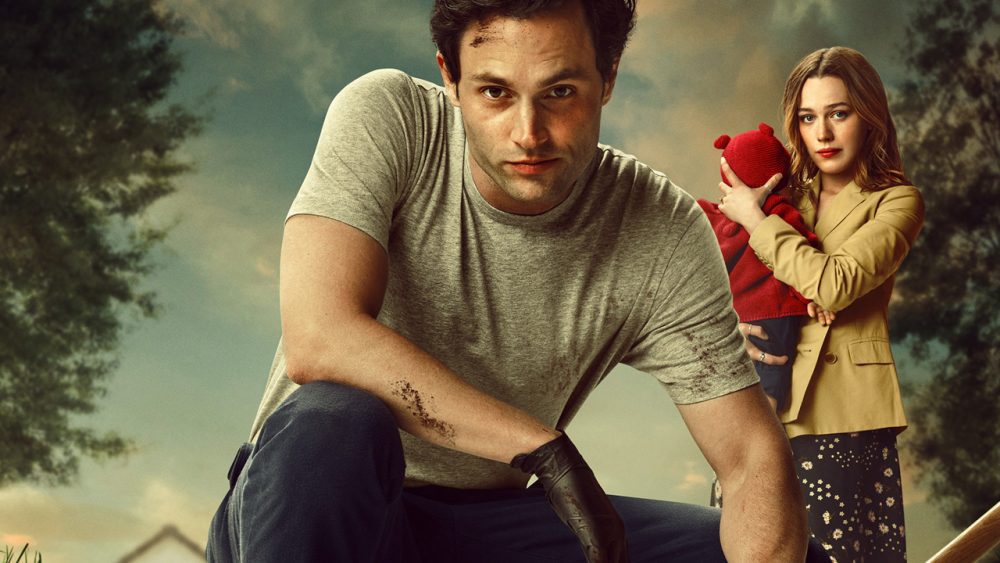Lights up on the quiet, suburban town of Madre Linda, California. A couple makes the expected move from a large city to a quieter setting in order to raise their newborn son. They hope that this change in environment will help them escape the pain they left behind in Los Angeles. However, this couple is no ordinary couple. Joe Goldberg (Penn Badgley) and Love Quinn’s (Victoria Pedretti) pasts are littered with death and psychological trauma, making their fresh start more difficult than they expected. You’s third season opens with Joe’s newfound obsession with his neighbor Natalie, and the events that follow this obsession expose the fractures in Joe and Love’s marriage. The acting and underlying themes in this season create the potential for You to become a successful thriller series, yet You ultimately falls short of this goal with this season’s obscure plot.
In anticipation of the release of the new season, I watched the two trailers and three teasers available on Netflix, eager to see the trajectory this season would take. After watching these snippets of the season, I was worried that the trailers and teasers revealed too much of what was to come. The clips I saw set up the typical pattern of behavior for Joe: encountering a woman, feeling compelled to learn everything about her, and going to whatever lengths to be with and protect her. The past two seasons of You have followed this format with Joe’s obsession leading the narrative. After watching the first couple episodes, I was pleasantly surprised to find that I did not accidentally spoil the season for myself. Since Love has joined Joe as one of the main characters, the focus of this season is on relationships, not individuals—but this change comes at the expense of the clarity of the plot.
An integral part of the show is Joe’s probing narration that gives him the opportunity to explain his thought process and justify his actions. Joe is very calculated, and the first-person narration allows the audience to understand and feel a degree of empathy for Joe. We are Joe’s personal jury as we listen to him plead his case. I enjoyed the fact that the writers utilize Joe’s narration more in this season by mirroring the changing of Joe’s affection with the changing of the “you” he addresses in his monologues. Joe’s urges do not die as soon as he gets married, which adds realistic complexity to his character.
I appreciate the creators’ efforts to differentiate this season from the previous ones; however, the plot spins out of control. One of the objectives of this season is to uncover the inequities in the foster and legal systems, yet this intention at times gets lost amidst all of the action. The increased flashbacks to Joe’s childhood and the addition of more characters with unique storylines makes it difficult to keep up with the important parts of the story. I could not binge this season as easily as the other seasons because after watching one or two episodes I needed a break to organize my thoughts. By the end of the season I almost forgot about the event from episode one that was the catalyst for the whole season.
Despite the convoluted plot lines, the theme of surveillance gives us an evocative reality check. The ease to which Joe can find information about a person’s social, personal, and work lives from their social media accounts reminds us that we as a society have become so comfortable with sharing our lives on social media that we forget the dangers that come with it. In another instance, the tech CEO Matthew Engler (Scott Speedman) proves he will do whatever it takes in the name of love, including hacking into security cameras and invading the privacy of his fellow town residents.
Though the plot suffered from too much happening at one time, the acting was horrifyingly real and raw. Victoria Pedretti in particular uses perfect facial expressions to encompass Love’s manic and impulsive energy. Her chemistry with Dylan Arnold, who plays Theo, comes effortlessly, and some of this connection could be attributed to the rumor that Pedretti and Arnold are dating in real life. Whether the rumors are true or not, the acting in this season proves to be a needed distraction from the action-heavy plot.
Additionally, the songs chosen for the soundtrack impeccably encompass the nuances of the scenes in which they are implemented. For example, during the climax of the final episode, “exile” by Taylor Swift featuring Bon Iver plays in the background. Taylor Swift has a gift of transporting herself into the point of view of another person and channeling their conflicting feelings into lyrics. In “exile,” Swift sings about how two people fail to understand each other, leading to the slow demise of their relationship. The melancholy frustration of a relationship fading away is a universal feeling, allowing the viewer to grasp onto the emotional tension in this scene and resonate with it. “exile” both lyrically and musically complements Joe and Love’s complicated relationship and was the ideal choice for this season finale moment.
After holding the number one spot on Netflix’s “Top 10” for multiple weeks, You has officially been renewed for a fourth season, but I worry that the end of season three positions the show to regress back to the familiar plot arc from seasons one and two. Nevertheless, I will be interested to see the ways that the creators incorporate the developing themes from this season into the following one. While the content of the show is hard to follow at times, season three of You includes convincing acting and forces us to contemplate how much control we truly have over our privacy, and this personal reflection continues long after the season ends.






